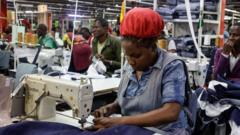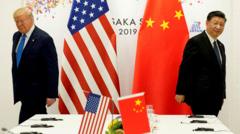The imposition of a 50% tariff on Lesotho’s textile exports signals a precarious future for the African Growth and Opportunity Act, vital for US-Africa trade relations.
Trump's Tariffs Threaten US-Africa Trade Cooperation

Trump's Tariffs Threaten US-Africa Trade Cooperation
Analysis reveals potential collapse of Agoa due to recent tariff hikes
Lesotho's garment industry is bracing for significant repercussions as President Donald Trump's announcement of a 50% import tariff looms. The textile sector in this small Southern African nation experienced a "terrible" day as industry stakeholders grappled with the prospect of greatly reduced access to the US market. Teboho Kobeli, founder of Afri-Expo Textiles, emphasized the distress over the massive market loss, which would necessitate price hikes for consumers.
The African Growth and Opportunity Act (Agoa), in place for 25 years, has acted as a lifeline for many African nations by providing duty-free access to the American market. Designed to foster industrial growth, it was crucial in helping countries diversify their economies and alleviate poverty. This sudden tariff on Lesotho's exports adds uncertainty to Agoa's status—a cornerstone of US-Africa economic ties.
While South Africa's trade ministers have articulated that these new tariffs effectively undermine Agoa's benefits, Kenya’s officials maintain hope that their clothing sector will adapt, arguing the new tariffs won’t be applied until Agoa lapses or Congress acts. Kenya stands to maintain some competitiveness given its relatively lower tariff impact compared to other textile exporters.
The future for Agoa looks bleak as Trump’s aggressive tariff policies suggest a possible end to the legislation's renewal this year. Traditionally, Agoa allowed various African products, including textiles and agricultural goods, to enter the US without tariffs, strengthening trade relations. However, under Trump's presidency, bi-partisan support for Agoa appears to be dwindling.
Lesotho's reliance on this trade framework is palpable, and the anticipated fallout could have dire consequences for its economy. The World Bank has previously estimated that losing Agoa could result in a substantial GDP decline for Lesotho, underscoring the act's importance for maintaining economic stability.
Trade analysts, like Michelle Gavin from the Council on Foreign Relations, label the tariff strategy as perplexing, stating it could lead to a further erosion of American influence in Africa at a time when China is expanding its economic partnerships on the continent.
As the situation unfolds, the consequences of Trump’s tariffs may unify Africa further towards establishing a continental free-trade area and exploring new trade alliances to offset the adverse impacts of potential Agoa dissolution. In the face of these changes, African countries may need to reevaluate their economic strategies and seek alternative markets for survival.





















